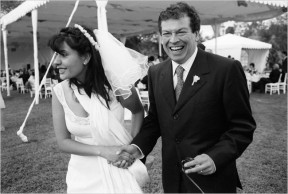A sword lodged in stone. That is how Francisco Goldman describes a daughter’s love for her missing father in his visceral tribute to his late wife Aura Estrada in his book Say Her Name which is partly a grief diary of a devastated husband and partly a fictionalised account of life after the death of a soul mate.
***
Sword in stone is also an apt metaphor for Goldman’s love for his young wife who died in a freak beach accident. A love stuck helplessly in intractable fate. In a moment in time that cannot be altered. The moment when he leaned over the cold as clay cheeks of his wife and realised she was gone forever. And that nothing could bring her back to life. That moment is non negotiable but the rest..the grief, the longing, the loss, the almost physical agony of an absence is rich material for a writer to use and work through. Grief can be a potent tool for a writer and writing through pain can be a device for self-preservation, for introspection, a process that can travel into the deepest recesses of the mind and unearth hurtful memories and conjure ghosts in order to lay them to rest. What emerges is an account that has no beginning, middle or end, or clean edges or sacred spaces or unblemished moments because everything is tainted by grief, by the almost obscene need to show and tell and hold the most intimate moments against the light of scrutiny and examine them with disconcerting, unsparing,honesty.
***
This is either a very brave book or a very exploitative one or perhaps just a compulsive one where no filters could be employed because it had to to be written, purged out of the system as it flowed in spurts, rivulets, in shuddering sobs, in liquid flames of pain in the aftermath of an unfathomable tragedy. In the process, he brings to life a unique young woman who had a tiny gap between her front teeth, a quirky upturned nose, full lips, hair that smelled like tres leches, a scarred yet other-wordly soul, love for poetry, hats, eccentric collectibles and an all-consuming love for the man who was somehow the answer to years of living with a sense of abandonment and a void left in her soul by an absent father. A man who adored her, her “swimmer’s little wiggle” under the shared warmth of a quilt, the way she walked on winter sidewalks, the way she lost her way routinely. played lost and found games with her wedding ring, the way she cooked long delayed meals, breathed, cried, wrote, lived, walked, shared the magic called love that only those who live it can believe in.
***
We see Aura live in the resonance of her voice, in the diaries she wrote as a lost, lonely child, as a confused teenager trying to understand,her place in the world, her love-hate relationship with her controlling mother and her longing for her other half, a friend she could tell everything too. And she does find him. A man decades older than her who somehow falls instantly in love with her and then miraculously, finds that she too is falling for him despite the age difference. With just enough money between them and shared passion for life, they build layers of memories upon memories in their apartment with the furniture they buy together, the pots and pans that too suffer bereavement when Aura passes away, the places they shop in, eat in, the routes they take, their routine endearments, their mutual passion. And when there is no Aura, the layers come apart, their seams frayed and bloody as Goldman rips them off inch by inch from the surface of his soul. As Goldman writes after it is all gone, ” I still regularly imagine that Aura is beside me on the sidewalk. Sometimes, I imagine I’m holding her hand, and walk with my arm held out by my side a little. Nobody is surprised to see people talking to themselves in the street anymore, assuming that they must be speaking into some Bluetooth device. But people do stare when they notice that your eyes are red and wet, your lips twisted into a sobbing grimace. I wonder what they think they are seeing and what they imagine has caused the weeping. On the surface, a window has briefly, alarmingly, opened.”
***
His life is now divided into two halves. The half he inhabited with Aura and the other, interminable one where her last memories are guarded by him with obsessive fear. The facial scrub she used with the indent of her fingers in it. Her shampoo. Her clothes he spreads out and falls into to smell her fading fragrance. He restructures Aura not just from memory but the writings she has left in her lap top and her diaries. There is the descent in phantasmagorical fantasies or wistful wish fulfilment when he begins to see and sense and feel Aura around him, in his bed, in her favourite chair, in a moonlit tree. There is the desperate seeking of something close to joy with women who are not Aura and never can be.
***
This is not a book designed to give answers about death or grieving or loss. It is partly an altar where Aura’s life is consecrated and partly a writer’s response to the most confounding life question of all, “How do I deal with the impossible, the unthinkable, the forever grief left behind by a forever love?”
***
The book is like a puzzle box with missing pieces or like a broken mirror where a hundred shards reflect Aura’s fragmented life. It is also an intimate account of a marriage that was too fulfilling perhaps to last a life time, too perfect to not be cursed by a sudden end. A marriage where nothing was left unsaid, unshared, unfinished except an ever after.
***
There is no sense of closure as Goldman veers between the raconteur narrating a story he cannot stop living and a journalist piecing together the history of a young girl who in her brief life, lived many identities. As the 24 hour child of a single mother. The young girl who was never enough. The young woman who was ripe for great academic success. And a wife who wanted to have children, adopt a dog, possibly a cat and live in a home with a front yard. Who made fun of her husband’s age, lied to him about the price of a quilt, woke him up in the middle of the night to make him switch off the lamp, shared every shred of her past with him and even stood between him and the disapproval of the other lifelong love of hers, her mother, whose pride, joy and grief she was.
***
There is a certain meandering self-indulgence in the book but given the nature of the narrative, it could not have been any other way.Say Her Name is about the kind of love movies are made about. The kind of love we dismiss as impossible and it is quite possible that we may see it being filmed sooner than later. It does however makes one wonder if the mother who lost her only daughter would have read the book the same way the readers did. Did she think, the book was a celebration of her daughter’s life or did it devastate her to see her being turned into a painfully vivid memory by a man she blamed, though wrongfully for her death? But then swords in stone cannot be argued with. Maybe, this book, like we said before, was meant to be written because the grief that birthed it knew no other way to spend itself.
The review was earlier published in the magazine Books & More (http://www.booksandmoremagazine.in)
Reema Moudgil is the author of Perfect Eight (http://www.flipkart.com/perfect-eight-9380032870/p/itmdf87fpkhszfkb?pid=9789380032870&_l=A0vO9n9FWsBsMJKAKw47rw–&_r=dyRavyz2qKxOF7Yuc







